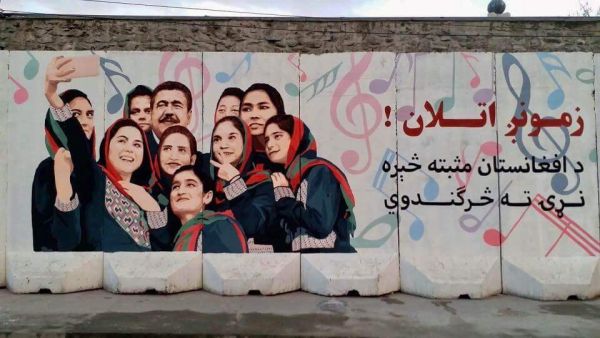The doors of the Afghanistan National Institute of Music in Kabul are closed.
The institute, called Afghanistan's LaGuardia, was founded by Ahmad Sarmast in a bid to bring a measure of joy back to Kabul.
During Taliban time, the people of Afghanistan were deprived of all their human and musical rights, including not having access to music education, to musical recordings, being denied their rights to listen to music, and any rights to learn and/or play an instrument.
#Taliban shut down #Afghanistan Institute of music in #Kabul. Lycée #Music was a school to teach traditional and modern music instruments. It was so famous few years ago when #Zuhra orchestra from that school, performed in EU and some other countries
— Massoud Hossaini (@Massoud151) September 1, 2021
With the inauguration of ANIM, music was firmly reintroduced into Afghan society. ANIM innovatively uses the soft power of music in rebuilding a nation transforming lives, communities, and facilitating the ethnic and intercultural dialogue within Afghanistan and internationally.
But today the students, teachers, and faculty have reason to fear. According to founder and director Ahmad Sarmast, "armed people entered school property".
The music school is located in Kabul and for almost a decade has been witnessing rapid growth under the leadership of Dr Sarmast.https://t.co/iIYtg2iKNa#Afghanistan #music #Taliban #KabulHasFallen #Kabulairport
— True Scoop (@TrueScoopNews) September 1, 2021
Young students, teachers, and faculty are staying home and currently are closing the doors of the Afghanistan National Institute of Music (ANIM) located in Kabul.
ANIM is acknowledged as the institution which brought music back to Afghanistan and restored and ensured the musical rights of the Afghan people.
“ANIM is committed to ensuring the musical rights of Afghan children, promoting musical diversity in Afghanistan, transcending cultural ethnic, religious, and gender barriers, and transforming the lives of Afghan children.”
The school Ahmad Sarmast founded was a unique experiment in inclusiveness for the war-ravaged nation with orphans and street kids in the student body, it sought to bring a measure of joy back to Kabul.
ANIM was a trailblazer: boys and girls were taught in the same room - a rarity in Afghanistan - and they practiced both Afghan and Western classical music.
"The students are all fearful and concerned. They clearly understand that if they return to the school, they might face consequences or be punished for what they've been doing," the school's founder and director, Dr. Ahmad Sarmast, told the BBC.
Ahmad is counting on the international artistic community to put up a fight for the Afghans' right to music.
Young students, teacher and faculty are staying home and currently are closing its doors of the Afghanistan National Institute of Music (ANIM) located in Kabul. The school has accomplished great successes in the realm of culture and arts in Afhanistan,… https://t.co/IEcg5SrIZ8 pic.twitter.com/JqCN9vGptV
— ??Climate Crisis Watch (@ClimateCrisis20) August 31, 2021
The school has been held up as a great success story in the effort to renew cultural life and the arts in Afghanistan. Ensembles from the school, including the all-female Zohra orchestra, have performed around the world.
Girls from #Afghanistan National Institute of Music perform folk music at a photo exhibition in Kabul to mark the International Day of Girl Child. pic.twitter.com/D9gj0txHg0
— TOLOnews (@TOLOnews) October 12, 2018
Now ANIM's future is uncertain. With the disorder caused by the Taliban's takeover of the city, the situation is very unpredictable. Will the school be closed? Would the Taliban outlaw music again? Are their treasured instruments safe?








